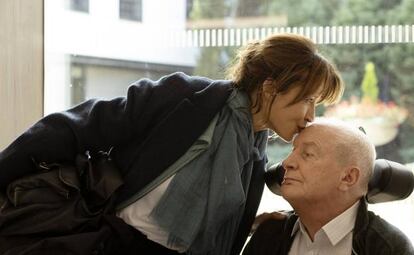François Ozon, considered the
enfant terrible
of French cinema, returns to a topical issue in his new film after dealing with pederasty in the Church in
Thanks to God
.
Everything
has gone well
deals with euthanasia, although it denies that it deals with the right to a dignified death.
“In this story I am specifically interested in the relationship between a father and a daughter whom he begs to help him die and to understand the dilemma this woman faces when something impossible is asked of her, something very painful” , the filmmaker explained this Thursday, visiting Madrid to present the film before its premiere this Friday in theaters after passing through the Cannes festival.
That is, Ozon intends to make the viewer reflect.
He is not going to give you his opinion on the matter.
"I do not have answers.
I have not faced this situation nor do I want to”.
More information
François Ozon: "The Church will not change if it is not forced by justice"
The French filmmaker's camera focuses on a bourgeois, intellectual, rich and "typically Parisian" family.
It is the one that portrays the book by Emmanuèle Bernheim, a writer who died in 2017, with whom Ozon co-wrote several of his scripts.
The author was the daughter of a famous homosexual art collector and the sculptress Claude de Soria.
After a stroke, the father asks his favorite daughter, played by Sophie Marceau, to help him die, but he will not be able to do so in France, a country where this right is not legalized, and he will have to resort to the help of a Swiss organization.
Ozon places "the heart of his film" in this relationship. As on other occasions, the French filmmaker bases the footage on a rebellion against the father figure, which in this case is marked by guilt, the traditional value of the family and, therefore, the unpunished authority of the parent despite being of apparently liberal characters. "His daughter describes him well: 'He was a bad father, but I would have loved to have him as a friend,'" says the director. “He belongs to a generation that disdains feelings. It is something vulgar, consider that you have to keep them inside. It is sometimes cruel and at the same time has charming elements.”
Everything went well
it is not intended, in the words of the director, to be “an American melodrama”, the film is so dry, at times schematic, that the charisma that Ozon tries to impress on his father is sometimes translated into black humor to try to soften that harshness.
Sophie Marceau and André Dussollier, in 'Everything went well', by François Ozon.
The film adds another aspect to this paradox that has the daughter in a constant debate: "It is the story of a man who loves life so much that he wants to die because he no longer has the possibility of living it as he liked."
And at this point he gets into another debate more focused on language: defending life through euthanasia against those who reject this right by defining themselves as pro-life.
“He can't even go to the bathroom by himself anymore.
So he decides that it's over, that he wants to stop this situation.
He is sad, he just has the idea that this is over.
The most complicated thing is for those who remain, those who have to accept this election”.
Those who remain, in this case his two daughters, also have to deal with the selfishness of a man, played by André Dussollier, who, in the watchtower built with his money from which he conceives the world, mocks economic injustice which implies the high cost of euthanasia. "When I documented myself, I realized that this process costs a lot of money, that's why I reflected it and wanted to compare it with the poorest people," says Ozon. "There are many people who cannot afford it, who cannot end their lives with dignity."
Ozon only grants a clear answer about his film. If in France this issue is not addressed, which has 80% of the citizens' support, according to his calculations, it is due to the influence of a Catholic
lobby
to which it grants relative power, but a lot of ability to make noise. “In the case of the government, we don't know if Macron is on the right or on the left. Let's say that he is fearful and is not going to deal with this issue, much less before an election”, he explains. It is not a priority for the current president and he considers that it is not a priority for the rest of the electoral candidates either in "a moment of mourning for the pandemic."
“They don't want to risk it.
But this topic moves on.
Except if an extreme right-wing candidate comes to power, which I hope will not happen”, he concludes and clarifies, in case he is giving too many answers: “This film is not political, it does not ask whether euthanasia is good or bad.
The cinema does not give answers, it forces the spectator to question himself”.

